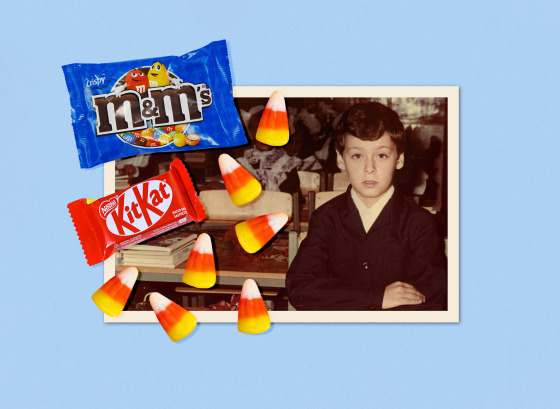Bobby and Aaron burst into my room and didn’t waste time. Bobby began stripping the bed of pillowcases. Aaron rooted around in the toy closet, emerging with an old man mask whose unruly hair was somehow both menacing and senile, like Freddy Krueger after a stroke. I didn’t ask questions — I had only recently started learning English, communication was slow and this seemed urgent. Bobby handed me a pillowcase, Aaron shoved the mask over my head, and they hustled me out to the sidewalk, where Bobby’s father, Mark, was waiting.
Triko-reet! A door opened, and I caught the flash of foil as a hand dropped candy into the pillowcase before Bobby and Aaron spun me around and ushered me to another house. Triko-reet was all it took; in fact, you didn’t even have to say it yourself, just be in the vicinity when it was uttered, and candy would rain down. Triko-reet, candy, go. The old man mask was too big and the eyeholes were tiny, reducing the world to a sticky darkness with two dime-size openings that bounced around with every step. Triko-reet, candy, go.
About three or four triko-reets in, panic hit. I broke off from my friends, sweat coating the inside of the rubber mask. This was wrong. How could I be so careless? What was I doing, indebting myself to people I couldn’t even see?
My parents had never warned me about taking candy from strangers; they didn’t need to.
My parents had never warned me about taking candy from strangers; they didn’t need to. The Soviet Union didn’t have strangers with candy, just as it didn’t have pediatricians with lollipops, or teachers with gold star stickers or free clothing for the poor. Strangers were dangerous and strangers with offerings doubly so. I didn’t need to learn that any more than I needed to be told fire was hot.
Things changed in late 1989, when my family joined the tens of thousands of other Jews who had fled Soviet antisemitism, seeking shelter in the West. My parents, sister, grandma and I were allowed to leave the Soviet Union with only two suitcases each and after a horrific, all-night search at the border to ensure we weren’t carrying anything of value. We spent the next half-year in Austrian refugee camps, waiting for American Jewish communities to sponsor us to come to the U.S.
For four months — ever since my family had been brought to West Lafayette, Indiana — the ingrained notion that nothing is free had battled against the reality that the clothes I wore, the mask, the pillowcases and everything else in the house we lived in had been donated to us by Aaron’s and Bobby’s parents and the rest of the community. Four months, and I still couldn’t bring myself to think of any of it as mine. Free was hazardous. Cheese in a mousetrap was free.
I peeled off the mask, flailing for the English words to tell Bobby’s father I needed to go — only to discover that the street was full of children with costumes and pillowcases. This was one of those masquerades mentioned in fairy tales I’d read in our dingy Soviet apartment. Suddenly, everything, including the reason I wore the mask, made sense, chasing away my panic.
It is an exercise in civic trust, a belief in one’s neighbors regardless of religion, creed or political party.
I slowly surveyed the scene, picturing the street grid of West Lafayette, calculating the time left in the day and how much candy that could yield, and the adrenaline surged once more.
I grabbed Aaron and Bobby and ran like only a 10-year-old could run when simultaneously confronted with the theory and proof of free chocolate. We hopped hedges, took shortcuts, sprinting, knocking, triko-reeting, vanishing. We were the wind. The candy hadn’t even hit the bottom of the pillowcases, triko-reet still hung in the air, Bobby’s father was gasping apologies and thank-yous, and we were already on to the next door.
Maybe it’s the corn syrup talking, but to me, Halloween will always be the quintessential American holiday. The Fourth of July and Thanksgiving don’t come close. Plenty of countries, dictatorships included, commemorate their nation’s founding and designate evenings to spend with relatives. Halloween is a night when kids visit strangers, people with no blood ties and no debt to their family, and receive gifts with no obligation in return. It is an exercise in civic trust, a belief in one’s neighbors regardless of religion, creed or political party. It’s a cheesy, cheery, schmaltzy, “Brady Bunch” optimism. My family and countless others have crossed oceans for it.
At the end of the evening, Aaron, Bobby and I sprawled like dragons atop what must’ve been a record-breaking hoard of candy on the carpet in Bobby’s den. Bobby’s father knelt next to me and tapped the last day of October on a calendar. “Triko-reet. Only tonight. Not tomorrow. Tonight, then we wait until next year,” he explained, lest I intended to spend the week harvesting the rest of the chocolate in Tippecanoe County.
I liked Bobby’s father. Many of the Americans helping us spoke loudly, and when we didn’t understand, they spoke louder. Bobby’s father spoke slowly and used props like the calendar.
“One triko-reet, one year. Is very good, Mr. Mark,” I nodded, slipping back into a sugary daze. I remembered late nights in Ukraine, skulking around the living room, eavesdropping on the adults talking about America as the land of milk and honey. Even as a kid, I hadn’t thought they meant it literally. Very good? I made a mental note to learn more English adjectives. Triko-reet once a lifetime was very good. Triko-reet once a year was biblical.
